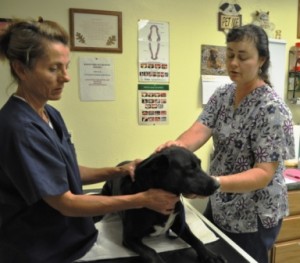
Why does my veterinarian want to test my dog or cats urine? What’s he/she going to find?
Veterinarians analyze urine for acidity or alkalinity, specific gravity (how concentrated the urine is), red blood cells, white blood cells, cancer cells, and bacteria (urine should be sterile).
They also look for crystals, casts, glucose, ketones, protein, and other substances whose presence can indicate a disease process is active.
A urinalysis is best performed in conjunction with blood tests and a physical exam to gain a more complete picture of how the body is processing and filtering certain substances.
For example, glucose should stay in the blood and not spill over into the urine via the kidney. Diabetes is of course suspected with the presence of glucose in the urine.
Allow your veterinarian to collect samples at the clinic or confirm with them their preferred process of collection. Fresh samples are best and need to be collected and handled in a manner that will reveal the most help information.




